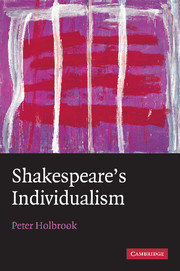Book contents
- Frontmatter
- Contents
- Acknowledgements
- Introduction
- PART I SHAKESPEARE, HAMLET, SELFHOOD
- PART II SHAKESPEARE AND EVIL
- 9 ‘Old lad, I am thine own’: authenticity and Titus Andronicus
- 10 Evil and self-creation
- 11 Libertarian Shakespeare: Mill, Bradley
- 12 Shakespearean immoral individualism: Gide
- 13 Strange Shakespeare: Symons and others
- 14 Eliot's rejection of Shakespeare
- 15 Shakespearean immoralism: Antony and Cleopatra
- 16 Making oneself known: Montaigne and the Sonnets
- PART III SHAKESPEARE AND SELF-GOVERNMENT
- Conclusion: Shakespeare's ‘beauteous freedom’
- Index
- References
10 - Evil and self-creation
Published online by Cambridge University Press: 06 July 2010
- Frontmatter
- Contents
- Acknowledgements
- Introduction
- PART I SHAKESPEARE, HAMLET, SELFHOOD
- PART II SHAKESPEARE AND EVIL
- 9 ‘Old lad, I am thine own’: authenticity and Titus Andronicus
- 10 Evil and self-creation
- 11 Libertarian Shakespeare: Mill, Bradley
- 12 Shakespearean immoral individualism: Gide
- 13 Strange Shakespeare: Symons and others
- 14 Eliot's rejection of Shakespeare
- 15 Shakespearean immoralism: Antony and Cleopatra
- 16 Making oneself known: Montaigne and the Sonnets
- PART III SHAKESPEARE AND SELF-GOVERNMENT
- Conclusion: Shakespeare's ‘beauteous freedom’
- Index
- References
Summary
Wickedness is a myth invented by good people to account for the curious attractiveness of others.
‘Phrases and Philosophies for the Use of the Young’ (1894), in The Artist as Critic: Critical Writings of Oscar Wilde, ed. R. Ellmann (Chicago, 1969), 433.We can put the issue in the starkest terms: are Shakespeare's works moral? The question sounds inexcusably quaint. Surely, at this late date in the history of criticism, we no longer discuss artists in such Sunday school language? We expect art to shock or appal (or in the cant phrase, ‘confront’). We do not expect it to edify. In fact, however, we have not made up our minds. It is true that words like ‘transgression’ feature everywhere in recent critical writing, and sometimes it appears as if the critics have decided the devil does indeed have the best tunes. It is also undeniable that much recent criticism focuses on politics rather than morals. Yet if épater le bourgeois is one aspect of contemporary discourse about literature and art, so is a renewed emphasis on the ethics of the imagination. For Martha Nussbaum the imagination supplements and corrects the work of moral philosophers. Literature provides a thick description of moral problems that philosophy treats in the abstract. Ethical philosophy skates over real existential complexities. In order to think clearly about moral choices one has first to feel them adequately.
- Type
- Chapter
- Information
- Shakespeare's Individualism , pp. 110 - 123Publisher: Cambridge University PressPrint publication year: 2010



